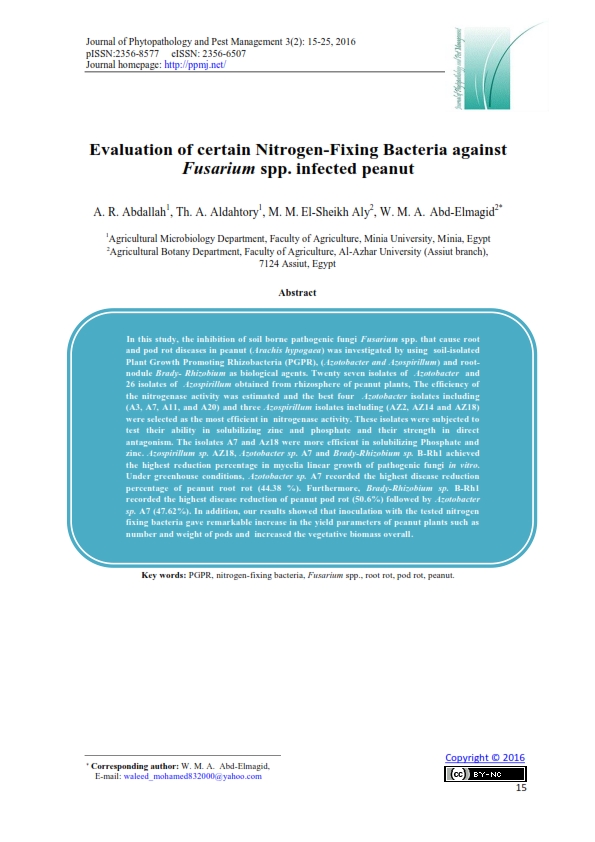Evaluation of certain Nitrogen-Fixing Bacteria against Fusarium spp. infected peanut
Keywords:
PGPR, Fusarium spp, Root and Pod rot, Peanut.Abstract
In this study, the inhibition of soil borne pathogenic fungi Fusarium spp. that cause root and pod rot diseases in peanut (Arachis hypogaea) was investigated by using soil-isolated Plant Growth Promoting Rhizobacteria (PGPR), (Azotobacter and Azospirillum) and root-nodule Brady- Rhizobium as biological agents. Twenty seven isolates of Azotobacter  and 26 isolates of Azospirillum obtained from rhizosphere of peanut plants, The efficiency of the nitrogenase activity was estimated and the best four Azotobacter isolates including (A3, A7, A11, and A20) and three Azospirillum isolates including (AZ2, AZ14 and AZ18) were selected as the most efficient in nitrogenase activity. These isolates were subjected to test their ability in solubilizing zinc and phosphate and their strength in direct antagonism. The isolates A7 and Az18 were more efficient in solubilizing Phosphate and zinc. Azospirillum sp. AZ18, Azotobacter sp. A7 and Brady-Rhizobium sp. B-Rh1 achieved the highest reduction percentage in mycelia linear growth of pathogenic fungi in vitro. Under greenhouse conditions, Azotobacter sp. A7 recorded the highest disease reduction percentage of peanut root rot (44.38 %). Furthermore, Brady-Rhizobium sp. B-Rh1 recorded the highest disease reduction of peanut pod rot (50.6%) followed by Azotobacter sp. A7 (47.62%). In addition, our results showed that inoculation with the tested nitrogen fixing bacteria gave remarkable increase in the yield parameters of peanut plants such as number and weight of pods and increased the vegetative biomass overall.
Metrics

Published
How to Cite
Issue
Section
License
Authors who publish with Journal of Phytopathology and Disease Management agree to the following terms:
- Authors retain copyright and grant the journal right of first publication with the work simultaneously licensed under a Creative Commons Attribution License that allows others to share the work with an acknowledgement of the work's authorship and initial publication in this journal.
- Authors retain copyright and grant the journal right of first publication with the work simultaneously licensed under the Creative Commons Attribution-Non Commercial License (CC BY-NC). This allows others to share the work with an acknowledgement of the work's authorship and initial publication in this journal.
- Archives of Agricultural Sciences Journal is an Open Access Journal, and articles published are distributed under the terms of the Creative Commons Attribution-Non Commercial License (CC BY-NC). Readers may copy, distribute, and display the work for non commercial purposes with the proper citation of the original work. However, the journal retains the right to exploit subsidiary rights on behalf of the authors.
- Authors are able to enter into separate, additional contractural arrangements for the non-exclusive distribution of the journal's published version of the work (e.g. post it to an institutional repository or publish it in a book), with an acknowledgement of its initial publication in this journal.
- Authors are permitted and encouraged to post their work online (e.g., in institutional repositories or on their website) prior to and during the submission process with full disclosure to the journal, as it can lead to productive exchanges, as well as earlier and greater citation of published work. Following publication in Archives of Agricultural Sciences Journal, the author should update the repository, and include a citation and link to the published work.
Click here for more information on Licensing policy
.png)




